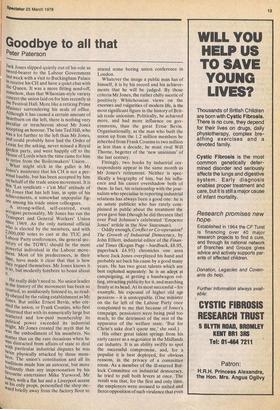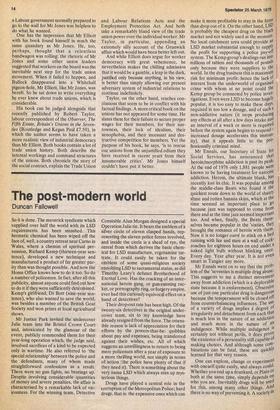Goodbye to all that
peter Paterson
Jack Jones slipped quietly out of his role as sWord-bearer to the Labour Government last week with a visit to Buckingham Palace to receive his CH and have a quiet chat with the Queen. It was a more fitting send-off, somehow, than that Wilsonian-style variety concert the union laid on for him recently at the Festival Hall. More like a retiring Prime Minister surrendering his seals of office. Although it has caused a certain amount of heartburn on the left, there is nothing very Peculiar or treacherous about Mr Jones accepting an honour. The late Ted Hill, who was a lot further to the left than Mr Jones, and could probably have had the Order of Lenin for the asking, never missed a Royal garden party, and went happily off to the House of Lords when the time came for him to retire from the Boilermakers' Union.
, What might stick in the gullet is Mr Jones's insistence that his CH is not a personal bauble, hut has been accepted by him on behalf of the trade union movement. It is this `Les syndicats — c'est Moi' attitude of h'Ir Jones that has left him, in spite of his achievements, a somewhat unpopular figure among his trade union colleagues. A strong-willed, self-centred, even arrogant personality, Mr Jones has run the 1,tansport and General Workers' Union since 1969. As the only national official no is elected by the members, and with 2,000,000 votes to cast at the TUC and Labour Party conferences, the general secretary of the TGWU should be the most Powerful individual in the Labour move1,11. ent. Most of his predecessors, in their 'line, have made it clear that that is how they regard themselves. Mr Jones knows it
but modestly forebore to boast about it. .
He really didn't need to. No union leader in the history of the movement has been so Courted, so assiduously listened to, so read131Y obeyed by the ruling establishment as Mr °Iles. But unlike Ernest Bevin, who created the union, or Frank Cousins, who first discerned that with its numerically large but scattered and low-paid membership its Political power exceeded its industrial Might, Mr Jones created the myth that he Was the embodiment of his members. No Matter that on the rare dccasions when he distracted from affairs/of state to deal With particular industrial disputes he was `kwice physically attacked by those mem:Jen. The union's constitution and all its ;tittlitions made him an autocrat, but more ,orilliantly than any impersonation by his Ijayourite entertainer Mike Yarwood, Mr tl'oes, with a flat hat and a Liverpool accent q8 his only props, personified the shop steward briefly away from the factory floor to
attend some boring union conference in London.
Whatever the image a public man has of himself, it is by his record and his achievements that he will be judged. By those criteria Mr Jones, the rather chilly ascetic of positively Whitehousian views on the excesses and vulgarities of modern life, is the most significant figure in the history of British trade unionism. Politically, he achieved more, and had more influence on governments, than the great Ernie Bevin. Organisationally, as the man who built the union up from the 1.2 million members he inherited from Frank Cousins to two million in less than a decade, he must rival Will Thorne, begetter of the 'new unionism' of the last century.
Fittingly, two books by industrial correspondents appear in the same month as Mr Jones's retirement. Neither is spec ifically a biography of him, but his influence and his career overshadow both of them. In fact, his relationship with the jour nalists who specialise in reporting industrial relations has always been a good one: he is
an astute publicist who has rarely complained in public about the treatment the press gave him (though he did threaten libel over Paul Johnson's celebrated 'Emperor Jones' article in the New Statesman).
Oddly enough, Conflict or Co-operation? The Growth of Industrial Democracy, by John Elliott, industrial editor of the Finan cial Times (Kogan Page — hardback, £8.95, paperback £4.95) chronicles one area
where Jack Jones overplayed his hand and probably set back his cause by a good many years. He has two great talents which are best exploited separately: he is an adept at campaigning, at getting a bandwagon rolling, attracting publicity for it, and marching firmly at its head. At its most successful — for example, his espousal of higher old age pensions — it is unstoppable. (One minister on the far left of the Labour Party once complained to me that because of Jones's campaign, pensioners were being paid too much, to the detriment of the rest of the apparatus of the welfare state. 'But for Christ's sake don't quote me,' she said.) His other great talent springs from his early career as a negotiator in the Midlands car industry. It is an ability swiftly to spot the successful compromise, and, for a populist it is best deployed, for obvious reasons, in the privacy of a committee room. As a member of the ill-starred Bullock Committee on industrial democracy, he tried to pull both levers at once. The result was that, for the first and only time, the employers were aroused to united and fierce opposition of such virulence that even a Labour government normally prepared to go to the wall for Mr Jones was helpless to do what he wanted.
One has the impression that Mr Elliott with his book found himself in much the same quandary as Mr Jones. He, too, perhaps, thought that a relentless bandwagon was rolling: the rhetoric of Mr Jones and some other union leaders suggested that workers on the board was the inevitable next step for the trade union movement. When it failed to happen, and Bullock disappeared into a Whitehall pigeon-hole, Mr Elliott, like Mr Jones, was bereft. So he sat down to write everything he ever knew about trade unions, which is considerable.
His book can be judged alongside that recently published by Robert Taylor, labour correspondent of the Observer, The Fifth Estate, Britain's Unions in the Seventies (Routledge and Kegan Paul r7.50), in which the author seems to have taken a more realistic view of industrial democracy than Mr Elliott. Both books contain a lot of trade union history. Both describe the internal workings and command structures of the unions. Both chronicle the story of the social contract, explain the Trade Union and Labour Relations Acts and the Employment Protection Act. And both take a remarkably bland view of the trade union power over the individual worker: Mr Taylor, in particular, appending an extremely silly account of the Grunwick affair which would have been better left out.
And while Elliott does argue for worker democracy with great vehemence, he nevertheless makes the chilling admission that it would be a gamble, a leap in the dark, justified only because anything, in his view, is better than simply allowing our present adversary system of industrial relations to continue indefinitely.
Taylor, on the other hand, reaches conclusions that seem to be in conflict with his factual findings. A more critical book on the unions has not appeared for some time. He slates them for their failure to secure proper wages for their members, for their narrowness, their lack of idealism, their xenophobia, and their incessant and destructive competition for members. Yet the purpose of his book, he says, `is to rescue our unions from the unjustified odium they have received in recent years from their innumerable critics'. Mr Jones himself couldn't have put it better.



































 Previous page
Previous page